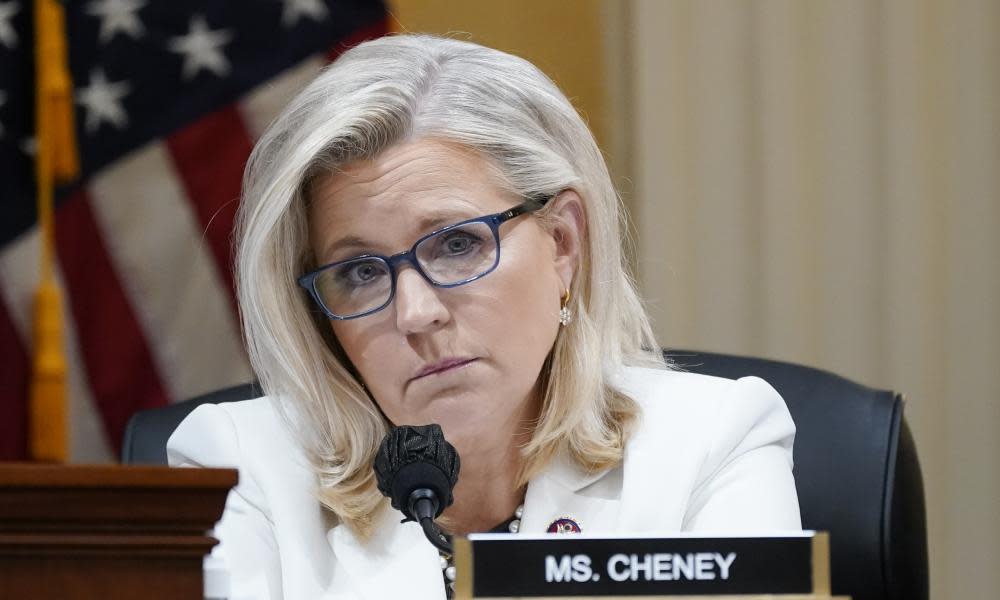In praise of Liz Cheney. May we have more politicians like her

On Tuesday, Wyoming Republicans determine the fate of Representative Liz Cheney, the putative leader of the anti-Trump forces in the Republican party.
Six days after the 6 January 2021 attack on the Capitol – when no other Republican in the House or Senate was willing to rebuke Trump – Cheney charged on the House floor that “the president of the United States summoned this mob, assembled the mob, and lit the flame of this attack. Everything that followed was his doing.”
The next day, Cheney joined nine other House Republicans and 222 Democrats in voting to impeach Trump.
So far, three of these 10 principled Republican lawmakers have lost their primaries. Two have won them. The remaining four are retiring.
As vice-chair of the House of Representatives’ January 6 committee investigating the causes of that attack, Cheney has ceaselessly and tirelessly helped lay out the case against Trump during eight public hearings held in June and July, with more to come.
In response, Trump has done everything possible to end Cheney’s career. He made sure House Republicans revoked her status as the third highest-ranking leader of the Republican caucus, and that Wyoming Republicans censured her.
Trump also selected Cheney’s opponent in Tuesday’s Republican primary, Harriet Hageman – who has rallied behind Trump and amplified his false claims that the 2020 election was stolen.
Hageman has a commanding double-digit lead over Cheney. (According to some reports, Cheney has been reluctant even to venture into Wyoming to campaign, due to death threats.)
If Liz Cheney loses her House seat, as seems likely, I hope she doesn’t disappear from public life. Although her views on countless substantive issues are the opposite of mine, I salute her.
She has displayed more courage and integrity than almost any other member of her party – indeed, given the pressure she was under, perhaps more than any lawmaker now alive.
The role Cheney has played raises a larger question about the meaning of representative democracy. Is it the responsibility of elected officials to represent the views of their constituents or their own principles?
The question isn’t limited to Republicans. As the midterms draw closer, some Democratic operatives and pundits argue that Biden and the Democrats must move to the “center” to win.
But where is the center? Halfway between democracy and fascism? And if Democrats must go there to win, what’s the point of winning?
I call this the Dick Morris paradox.
In early 1996, Bill and Hillary Clinton summoned pollster Dick Morris to the White House to make sure Bill Clinton would be re-elected.
Morris’s advice to Clinton was to move to the center (“triangulate”) and say nothing in his re-election campaign except that the economy was terrific and would be even better in the second term.
Whenever I ran into Morris slithering around the West Wing, I suggested he urge Clinton to advance some policies for the second term’s agenda – a hike in the minimum wage, universal pre-K, paid family leave, Medicare for all.
Morris’s invariable response: “If Clinton pushes any of these, there won’t be a second term.”
I said there was no point in having a second term without an agenda to do something important in the second term. He argued back that there was no use having an agenda without a second term.
But if the only way to get or keep power is to say nothing to the public about what you believe or intend to achieve, or to mislead the public, what’s the point of having power?
To Morris and most other political operatives, this question makes no sense. Politics is about getting and keeping power. Principles have nothing to do with it.
To Dick Morris operatives, politicians have a responsibility to mirror whatever the public wants or believes.
But what if the public has been lied to by a conman who tells them the last election was stolen? What if he has cynically exploited their bigotry, ignorance or distrust?
Should candidates merely reflect what the conman has stirred up, as Hageman has done in Wyoming and other Republican candidates are doing with Trump’s “big lie” elsewhere?
Or should candidates risk losing political power (or never gaining it) by standing on their own principles?
The dilemma on the Democrats’ side is not nearly as dangerous for the nation, but it exists, nonetheless.
Some of today’s Democratic candidates are moving to the so-called “center” because they’ve convinced themselves they must do so to gain or hold power, which is better than not having any.
But is gaining or holding power more important than telling the public what one truly believes, and speaking truth?
Robert Reich, a former US secretary of labor, is professor of public policy at the University of California at Berkeley and the author of Saving Capitalism: For the Many, Not the Few and The Common Good. His new book, The System: Who Rigged It, How We Fix It, is out now. He is a Guardian US columnist. His newsletter is at robertreich.substack.com

 Yahoo Movies
Yahoo Movies 
